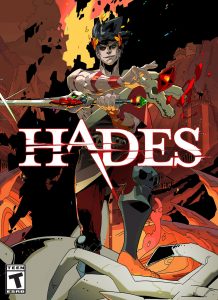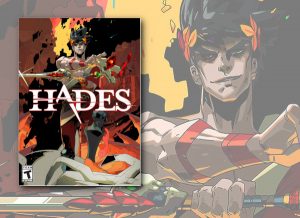HADES (Game Review)
Hades is the latest from Supergiant Games, who burst onto the scene with Bastion and established themselves as one of the more reliable and consistent indie game developers. Hades is an excellent game that further cements that reputation, and I’ll think I’ll go play another round right now.
…
…
Oh, you’re still here? A review needs to be more than two sentences long? Fine, I need to charge my controller anyway.
In one sentence or less, Hades is a Greek Mythology themed roguelite with Diablo-esque action RPG gameplay.
Let’s break that down:
 You play as Zagreus, the Son of Hades and an obscure god of hunting and rebirth (which I must say is pretty perfect for a roguelite). Zagreus wants to escape the Underworld and go on a field trip to Greece for reasons that get explained as you progress in the story. To do that, you have to fight through four floors of pain, each being a level of the Greek Underworld. Each floor is split up into a bunch of chambers, where you get locked in a room with spawning enemies and have to clear them all to proceed. Your moveset consists of a basic attack, special attack, dash, and cast. The basic and special attacks are unique to each weapon (of which there are six), the dash is for i-frames and quick movement to get out of trouble, and the cast is a limited use ranged attack that mostly exists for ranged chip damage and to interact with other mechanics.
You play as Zagreus, the Son of Hades and an obscure god of hunting and rebirth (which I must say is pretty perfect for a roguelite). Zagreus wants to escape the Underworld and go on a field trip to Greece for reasons that get explained as you progress in the story. To do that, you have to fight through four floors of pain, each being a level of the Greek Underworld. Each floor is split up into a bunch of chambers, where you get locked in a room with spawning enemies and have to clear them all to proceed. Your moveset consists of a basic attack, special attack, dash, and cast. The basic and special attacks are unique to each weapon (of which there are six), the dash is for i-frames and quick movement to get out of trouble, and the cast is a limited use ranged attack that mostly exists for ranged chip damage and to interact with other mechanics.
The Olympian Gods, in their infinite vanity, assume that you’re ditching your boring father to come live with them, and want to help you escape to the surface world. When you clear a room bearing one of their symbols, they allow you to choose one of three randomly selected boons. Typically, these add damage and a trademark status effect to your attack, special, dash, or cast, but they’ll also offer stat boosts and more complex effects. For example, Zeus adds chain lightning to attacks, Athena lets you deflect projectiles, Hermes provides speed boosts, and Artemis gives you critical hits. As you get deeper into the game, it’s really fun to see how the various boons interact with each other, and occasionally you’ll even get Duo boons, which combine two gods’ domains for crazy effects. Since so much of the game is randomly generated, including the boon selections, you’re constantly making decisions on how to focus your Zagreus build in a given run. Do you want to keep collecting Zeus boons and fill the screen with lightning, or do you want to diversify? Do you want to mix status effects or go with a boon that will help your defense? There are constant decisions and part of getting good at the game is learning to judge what boons will combine for the most powerful effects to best guarantee the success of your escape attempt.
Being a roguelite, there is also some permanent progress. As you fight through the underworld, you collect a variety of currencies to unlock permanent effects. After each death, Zagreus returns to the House of Hades, the game’s home base. Here, you can spend those currencies to purchase permanent upgrades like unlocking new weapons, improving Zagreus’ survivability, or applying cosmetic changes to the House of Hades. This is a classic roguelite mechanic that helps you lower the difficulty ceiling as you play to avoid frustration, and I think the game finds a good balance between providing permanent buffs to give a sense of progression and keeping the pressure on the player to continue gaining skill and learning strategies to fight each boss and enemy. You still aren’t going to beat the game by button mashing no matter what upgrades you buy.
Another way the game presents progress is its method of storytelling. While many roguelites reset the whole story at the beginning of each run, or tack on a conceit that you’re a playing as a resurrection, clone, or descendent of the original playable character, Zagreus is immortal and every run is part of his story. When he dies, he is reborn in the House of Hades. Characters comment on his progress, struggles, and death. Each time you talk to an NPC, they have something new to say, and their own personal stories advance. They develop friendships and rivalries with Zagreus, and Zagreus helps them with their own troubles. In this way, the game drip feeds you story elements, and I’ve never seen a roguelike put this much effort into storytelling in general, let alone integrate it so seamlessly with the gameplay.
I’d also like to touch on this game’s treatment of Greek mythology. Hades brings in a lot of gods and heroes from the myths and does an admirable job staying true to the source material. The most credit goes towards the portrayal of Hades himself. In many adaptations, most notably Disney’s Hercules, Hades is treated like the Christian Devil, which is wildly off base. Supergiant gets him right. Here, Hades is a stern, job-focused administrator with a strained relationship with his family. He’s not evil, just kind of a dick. Another element that shows Supergiant’s understanding of the mythology are the Trials of the Gods. These are rooms containing boons from two different gods. Whichever one you choose, the other god gets angry and attacks you. Survive the room and they’ll quickly forgive you for the grave transaction of talking to someone else first, and offer you their boon anyway. It’s a perfect encapsulation of the capricious and petty nature of this dysfunctional family.
After your first escape from the Underworld, you learn that Hades is far from over. There’s more to the story and new mechanics open up. For example, the first victory unlocks the Pact of Punishment, which is essentially this game’s version of New Game Plus. Before each run, you can choose from a list of difficulty modifiers (enemies do more damage, enemies have more health, bosses get new moves, etc). It’s a very modular system and I respect the choice, but I personally don’t really care for choosing my pain and would have preferred a more traditional New Game Plus to scale the difficulty. The main reason to engage with this system, other than to prevent the game from feeling too easy after you’ve beaten it a few times, is that it resets the boss rewards, which are rare resources you can only earn once per weapon per difficulty level.
My main criticisms on the gameplay are twofold: First, there are a lot of obtuse mechanics that you have to stumble into or use a guide to understand. For example, the first boss you beat drops an item called Titan’s Blood, and it was a long time before the game even hinted at what it was for, and longer still until I had a chance to use it. Related to that, I think it went a little overboard with the variety of currencies. There’s Darkness, Keys, Gems, Nectar, Ambrosia, and Diamonds. It was a bit much. They are all used in different ways and gems in particular became useless to me pretty early on.
Overall, though, Hades is an addictive action RPG with a tight gameplay loop, a unique approach to storytelling for its genre, and plenty of reasons to keep coming back. I highly recommend trying it out.

